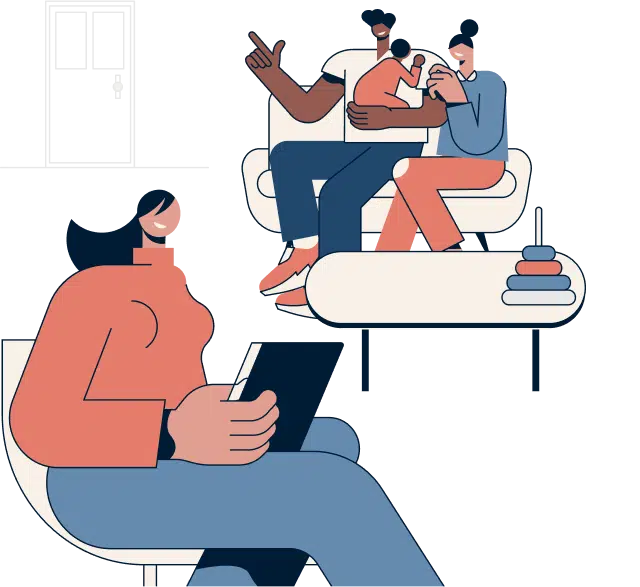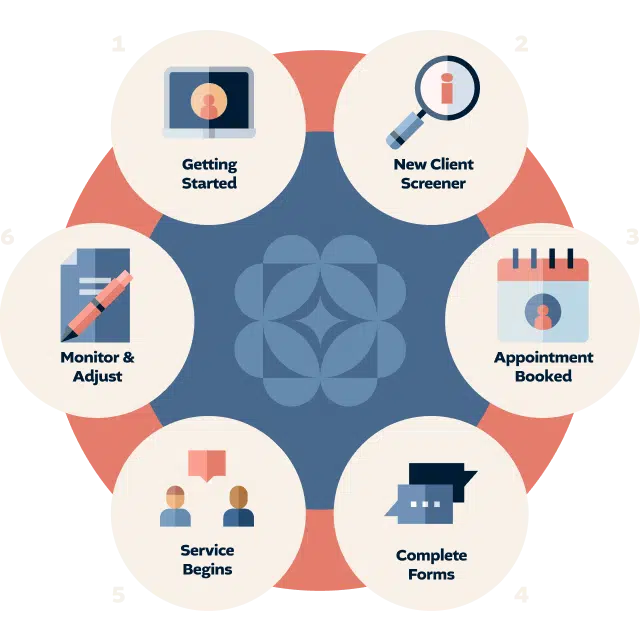Our Clinical Approach
The OICBT provides a comprehensive range of services that are evidence-based, holistic, and customized to the unique needs of clients and the community we serve.
Cognitive Behavioural Therapy
Cognitive Behavioral Therapy (CBT) targets unhelpful thought patterns, behaviors, emotions, physical sensations, and environmental circumstances to alleviate psychological distress and improve wellness.
Our approach extends CBT principles by emphasizing mindfulness, acceptance, values, meaning, relationships, and the therapeutic relationship. We incorporate CBT-related approaches that include Mindfulness-Based Cognitive Therapy (MBCT), Acceptance and Commitment Therapy (ACT), Dialectical Behavior Therapy (DBT), and Schema Therapy.
Our approach is tailored to your unique needs and intended to empower you to become self-directed in managing your psychological well-being over time.
Stepped Care Model
Stepped care is used in mental health assessment and therapy to promote efficient and effective treatment. This involves a systematic approach to matching the intensity of interventions to the needs of the individual.
It begins with a thorough assessment and offers lower-intensity interventions with the option to receive more intensive treatments if needed. Regular monitoring of progress and client feedback ensures the treatment matches one’s evolving needs (stepping up or down relative to symptom or goal improvement or decline).
Overall, stepped care aims to ensure you get the right level of care given your unique situation.
In-Person and Virtual Therapy
We offer both in-person and virtual therapy. Virtual therapy, also known as online therapy or teletherapy, is conducted through digital communication platforms, allowing you to engage in therapy remotely via video calls or phone calls.
This approach offers numerous benefits, including accessibility for those facing geographical limitations, physical disabilities, or scheduling challenges. It provides greater flexibility and convenience, especially for individuals with busy lifestyles.
Research indicates that virtual therapy can be just as effective as in-person therapy for many individuals and conditions. For those who prefer face-to-face sessions, we also offer in-person therapy for individual therapy. Group therapy and Diagnostic Assessments are typically conducted virtually.
Please note that cognitive testing is available exclusively in person.
Our Institute
We aim to provide an array of innovative mental health care services (assessment and treatment) that are customized to fit the unique needs, preferences, and circumstances of each client.

Our Therapeutic Approach
Our approach recognizes the individuality of each person’s struggles and strengths. We draw from a variety of research-informed techniques to create a treatment plan that resonates with the client, fostering a deeper connection and greater progress.
This personalized approach acknowledges that there is no one-size-fits-all solution to mental health challenges and emphasizes collaboration between therapist and client to achieve meaningful progress.

Our Clients
We are proud to have a diverse range of individuals seeking services at the OICBT. Therapy requires courage to confront struggles, vulnerabilities, and painful emotions in order to heal, grow, and live more authentically and meaningfully.
Each therapy client has a unique story and set of circumstances. Not oversimplifying conceptualizations provides the opportunity to see the richness and depth of each person.

Our Process
The intake process is the first step in starting assessment or therapy services at the OICBT.
Our personalized intake process gathers information about your background (medical history, previous mental health treatments), current functioning (symptoms, problem areas, strengths, cultural background & identities, life circumstances) and preferences and goals (therapy goals, service or therapist preferences).
Matching recommendations to your needs is key to obtaining the most from your services.
Treatment Services Offered
Mental health presentations and goals can vary widely based on individual experiences, backgrounds, and circumstances. We offer an array of services (program, therapy approaches, areas of focus) to personalize care to diverse needs and experiences.
- Mood Disorders (Depression, Bipolar)
- Anxiety Disorders (Generalized, Social, Panic, Health, Specific, Agoraphobia)
- Obsessive Compulsive Disorders
- Hair Pulling (Trichotillomania)
- Skin Picking (Excoriation)
- Hoarding
- Borderline Personality Disorder
- Obsessive Compulsive Personality Disorder
- Trauma and PTSD
- Substance & Alcohol Misuse
- Eating Disorders
- Anger management
- Attention and Hyperactivity Disorder (ADHD)
- Work Stress/Burn-out
- Return to Work (RTW) Goals
- Home, Work, or School Accommodations and Strategies (ADHD; Learning Disorders)
- Chronic Pain
- Irritable Bowel Syndrome
- Insomnia
- Health-related goals (Exercise, Nutrition)
- Maternal Health
- Tinnitus, Misophonia, & Hyperacusis
- Psychosis
- Grief/Loss
- Existential Goals (Meaning, Purpose, Actualization)
- Life Transitions (Mid Life, Divorce, Retirement, “Empty Nest”)
- Diversity-Informed Care (Sexual Identity; Gender Identity; Ethnicity/Race/Culture; Refugees; Military Status)
Please note that we are unable to address the following concerns at this time:
- Post-concussion syndrome: if ongoing symptoms and this is the targeted aim of therapy
- Neurological disorders (dementia, essential tremor; Alzheimer’s disease, Parkinson’s disease, Huntington’s disease, prion disease, Multiple sclerosis)
- Extreme Eating disorder that requires hospitalization
- Severe Substance Misuse that first requires Detox services
- Acute crisis situations
- Acute mania
- Acute psychosis
- Acute suicidal intent
- ADHD+Intermittent Explosive Disorder
- Narcissistic personality
- Oppositional defiant disorder (ODD)
- Antisocial Personality Disorder
- Kleptomania
- Post Menstrual Dysphoric Disorder or Premenstrual Syndrome
- ADHD Assessments + specific comorbidities or age ranges (for clients 60 or older or clients under 11.5 years; ongoing post-concussion syndromes, with diagnosed or suspected Autism Spectrum Disorder; )
